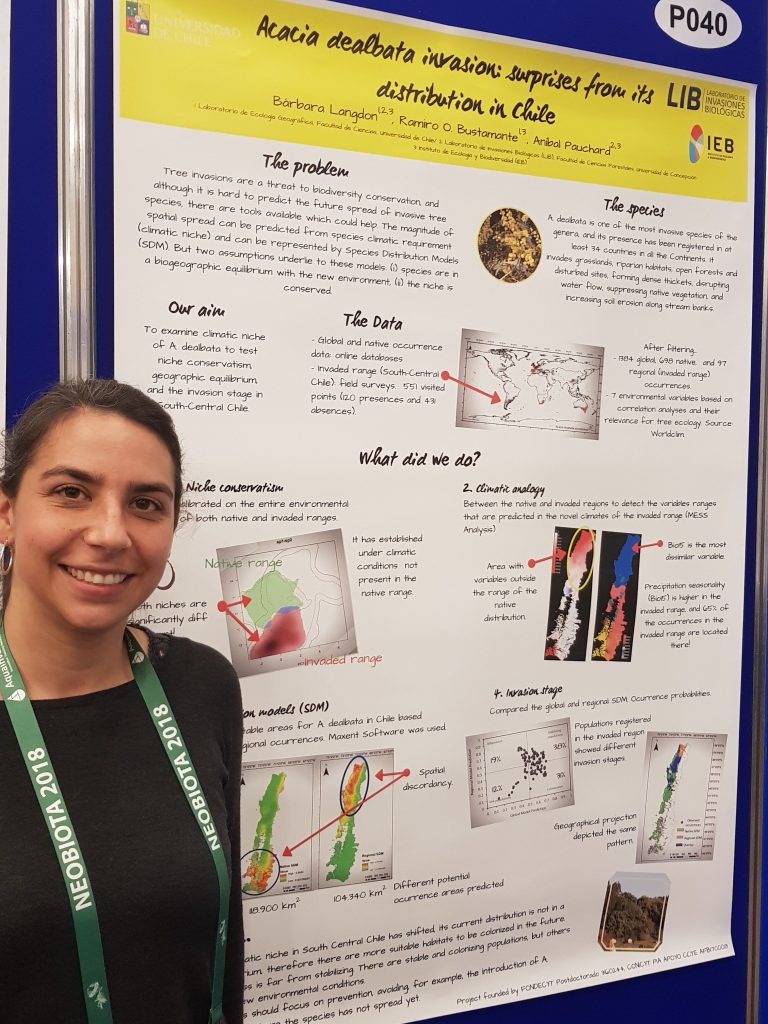The academic from the Faculty of Forest Sciences UdeC and director of the Laboratory of Biological Invasions (LIB), Dr. Aníbal Pauchard, together with the postdoctoral student Bárbara Langdon, participated as exhibitors at the International Conference on Biological Invasions NEOBIOTA 2018, held in Dublin, Ireland, from September 4 to 7, 2018.
The conference, hosted by the European group of invasion ecologists Neobiota, brought together more than 300 researchers from around the world and aimed to provide an opportunity for dialogue, debate and discussion on biological invasions from both fundamental and more practical perspectives, making it an opportunity for collaboration between researchers, environmental associations, research groups, state agencies and decision makers.
 Dr. Aníbal Pauchard’s participation focused on the presentation of the work carried out in the FONDECYT project “Quantifying the impacts of Pinus contorta on the micro-environment, vegetation and mycorrhizal communities”, carried out in the Malalcahuello area of the Araucanía region and the Coyhaique alto sector in the Aysén Region. In addition, postdoctoral researcher Dr. Bárbara Langdon participated in the conference panel session, showing the results of her research on the climatic niche change of Acacia dealbata in south-central Chile, part of the FONDECYT project “Functional traits or niche attributes: two approaches to predict tree invasions in Chile”.
Dr. Aníbal Pauchard’s participation focused on the presentation of the work carried out in the FONDECYT project “Quantifying the impacts of Pinus contorta on the micro-environment, vegetation and mycorrhizal communities”, carried out in the Malalcahuello area of the Araucanía region and the Coyhaique alto sector in the Aysén Region. In addition, postdoctoral researcher Dr. Bárbara Langdon participated in the conference panel session, showing the results of her research on the climatic niche change of Acacia dealbata in south-central Chile, part of the FONDECYT project “Functional traits or niche attributes: two approaches to predict tree invasions in Chile”.
“This conference allows us to exchange experiences with the most advanced groups on the subject of invasive species in Europe and the world, including studies on plants, animals and invasive microorganisms,” commented Dr. Aníbal Pauchard. Likewise, Dr. Bárbara Langdon tells us that “it is always interesting to share points of view with people who are working on related topics or sometimes you are even surprised by observations from people who work in other areas of biological invasions. In addition, it gives us the opportunity to talk with researchers who have a lot of experience in the subject but also young people who can put forward different ideas.”
In addition to the scientific presentations, the conference allowed for discussion of the implementation of the new regulation on invasive species in the European Union. In this regard, Dr. Pauchard indicated that “Chile must move quickly to standardize its legislation on invasive species and the first reference is the European Union. Without a doubt, hearing about this process firsthand is relevant to be able to help implement these policies in Chile.” The next Neobiota meeting will be held in Croatia in 2020.

